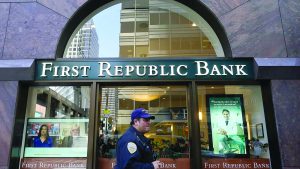BLOOMBERG
First Republic Bank’s week of harrowing stock drops and urgent work towards a deal to shore up its balance sheet ended with the lender’s fate in limbo.
The Federal Deposit Insurance Corp (FDIC), keeping tabs on the bank’s deposits and funding, hasn’t reached a decision on intervening at the troubled lender, according to people with direct knowledge of the matter. Some senior officials there expect the firm’s management will continue pursuing talks for a private-sector deal to bolster its finances.
Still, the FDIC’s position could change if there’s an unforeseen development.
Meanwhile, larger lenders have started preparing for the possibility that the government seizes First Republic and asks them to bid on the bank or its assets. While banks have been reluctant to put up money to rescue the firm in recent days, some are keen to make offers if it’s auctioned.
JPMorgan Chase & Co and PNC Financial Services Group Inc are among the big banks vying to buy First Republic in a deal that would come after a government seizure, the Wall Street Journal reported.
A spokesperson for the FDIC said that the agency doesn’t comment on “operating institutions.†Representatives for California’s banking regulator, which would take the lead in deciding whether the San Francisco-based lender has failed, didn’t respond to requests for comment.
The company’s stock plunged by more than half amid renewed concern that the FDIC might seize the bank. A few proposals for an industry-led rescue have surfaced in recent days. But they have yet to yield any deal.
With the stock down 97% this year, bankers and regulators have been stuck in a standoff, with both sides seeking to avoid steep losses and hoping the other will handle the troubled firm.
A group of 11 banks that deposited $30 billion into First Republic in March to give it time to find a solution have proved reluctant to invest in the firm itself, even if that means they might lose some cash in their accounts. Some stronger firms are waiting for the government to offer aid or put the bank in receivership, a resolution they view as cleaner — and potentially ending with a sale of business lines or assets at attractive prices.
The collapse of SVB in March stoked concerns about the soundness of regional lenders with such holdings, prompting wealthy depositors and businesses with uninsured deposits to yank their money. First Republic was left paying more for funding than it earns on many of its assets. Still, the bank’s executives emphasised in an earnings report, the firm has ample cash reserves to continue meeting clients’ needs.
 The Gulf Time Newspaper One of the finest business newspapers in the UAE brought to you by our professional writers and editors.
The Gulf Time Newspaper One of the finest business newspapers in the UAE brought to you by our professional writers and editors.
